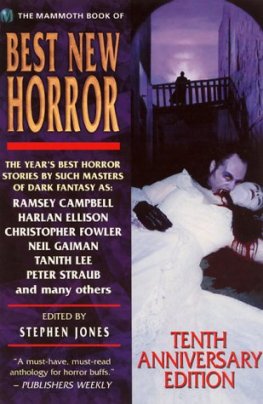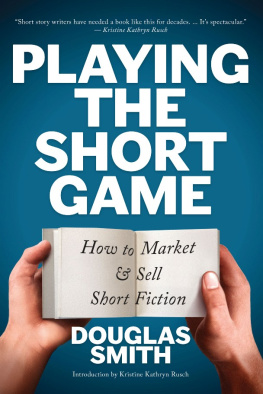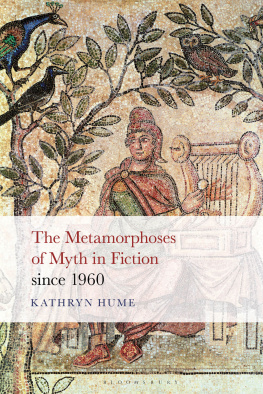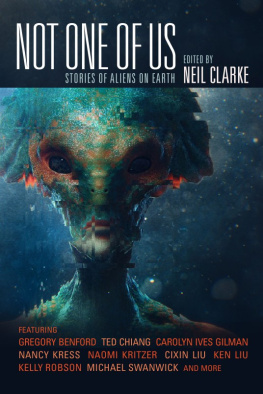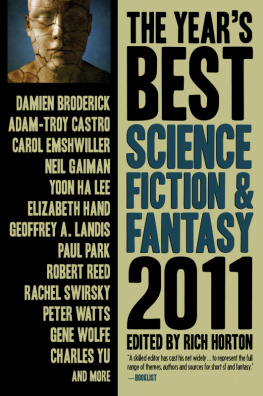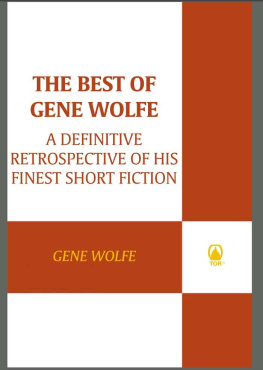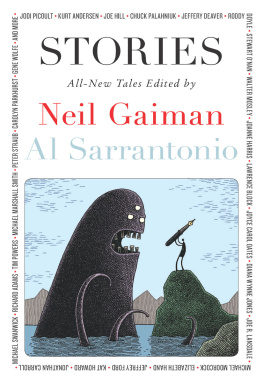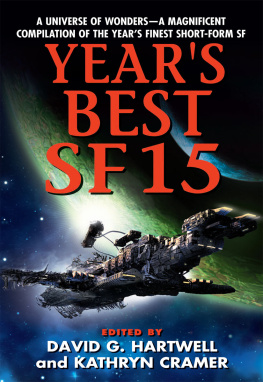Year's Best SF 17
Book 17 in the Year's Best SF series
An anthology of stories edited by Kathryn Cramer and David G Hartwell
This is a book full of science fictionevery story in the book is clearly that and not something else. It is our opinion that it is a good thing to have genre boundaries. We have a high regard for horror, fantasy, speculative fiction, and slipstream, and postmodern literature. We (Kathryn Cramer and David G. Hartwell) edit the Years Best Fantasy as well, a companion volume to this onelook for it if you enjoy short fantasy fiction too. But here, we choose science fiction. This volume is intended to represent the variety of fine stories published in the year. But bear with us for a few paragraphs as we first give some characterization of the year in SF.
In 2011 the earth quaked for the publishing industry, especially in the U.S. The third largest bookseller, Borders, the bookstore chain that accounted for about 20 percent of everyones business, went bankrupt. There were five other important bankruptcies in the U.S. bookselling business, and in Canada, one big one, The H.B. Fenn Company. Fenn was the largest distributor in Canada of U.S. books. Together, these events hurt the profitability of book publishing a lot. Specifically, the lack of so many formerly supportive distribution channels for books lowered the initial printings, and therefore the sales, of nearly all new books.
But what rankles most publishers is that first, when a store or customer goes bankrupt, they dont pay for the books shipped to them, but do get to sell them at a going-out-of-business salethe money goes to the secured creditors, the banks that loaned the stores money, not the suppliers. And second, because the books were sold, even though they were not paid for, the authors must be paid royalties by the publishers as if they had been paid, increasing the publishers losses. Wow!
The substantial increase in e-book sales in the first half of 2011 made up for some but certainly not all of this, and then e-book sales generally declined in the second half of the year. It became really apparent as well that e-book sales were adversely affecting mass market paperback sales, even more than in 2010. The disparity in money was profound. One publishing newsletter pointed out that the bestselling e-book original of 2011 made about $500,000.00, while the bestselling hardcover book made between 40 and 50 million dollars. Physical books are still where the money is, and in the e-book industry the real profit is still in the sale of devices, which are replaced by newer devices, not in the sale of books. And it appears that e-book rental is being encouraged. As this is written it is not possible to predict what will happen in 2012. All we know is that nearly everyone is making less profit. The squeeze is on.
Science fiction, of the genre variety, was a bit harder to find in 2011 than in 2010. Certainly it continued to appear in Analog and Asimovs, in F&SF and in Interzone, and in a lot of original anthologies. But it seemed to us to be a bit scarcer, and a lot more often grading off into fantasy and mixed genres, while fantasy fiction (not in any way SF) quite obviously increased.
Short fiction venues remained about the same in 2011, and a pale shadow of what they were a decade ago. Science fiction magazines once again lost some circulation. Online venues, which might pay contributors but make little money, grew or failed again last year. Non-profit Strange Horizons and Tor.com appeared most stable of the online bunch. Clarkesworld and Lightspeed did distinguished work too. Lots of small pressesor perhaps small publishers is now the proper apellation for these fewcarried the ball for innovation in 2011, again especially the Bay Area cluster of Night Shade, Tachyon, and Subterranean. And as usual, a large amount of the best short fiction originated in the years new crop of anthologies. Among the best of these were Welcome to the Greenhouse, edited by Gordon Van Gelder, Solaris Rising, edited by Ian Whates, Living on Mars, edited by Jonathan Strahan, and Engineering Infinity, edited by Jonathan Strahan.
And that is the context in which all of the following stories first appeared. This then is a book about whats going on now in SF. We try in each volume of this series to represent the varieties of tone and voice and attitude that keep the genre vigorous and responsive to the changing realities out of which it emerges, in science and daily life. It is supposed to be fun to read, a special kind of fun you cannot find elsewhere. The stories show, and the story notes point out, the strengths of the evolving genre in the year 2011.
We make a lot of additional comments about the writers and the stories, and whats happening in SF, in the individual introductions accompanying the stories in this book. Welcome to the Years Best SF 17.
David G. Hartwell & Kathryn CramerPleasantville, NY
The Best Science Fiction of the Year Three
KEN MACLEOD
Ken MacLeod (Kenmacleod.blogspot.com) was born in Stornoway, Isle of Lewis, Scotland, on August 2, 1954. He is married with two grown-up children and lives in West Lothian. He has an Honours and Masters degree in biological subjects and worked for some years in the IT industry. Since 1997 he has been a full-time writer, and in 2009 was Writer in Residence at the ESRC Genomics Policy and Research Forum at Edinburgh University. He is the author of thirteen novels, from The Star Fraction (1995) to Intrusion (2012), and many articles and short stories. His collection, Giant Lizards from Another Star, was published in 2006. His novels and stories have received three BSFA awards and three Prometheus Awards, and several have been short-listed for the Clarke and Hugo Awards.
The Best Science Fiction of the Year Three was first published in Solaris Rising: The New Solaris Book of Science Fiction, edited by Ian Whates, who had a particularly good year as an editor of anthologies in 2011. It is a model of SF plotting, and we feel that in it MacLeod engages both with the current state of the world and with the current state of science fiction in a gripping and entertaining fashion. So we chose to put it first in this book.
In the Year Three, lanne trois as its called here, there are three kinds of Americans living in Paris: the old expats, the new migrs, and the spooks. And then there are the tourists, whove travelled via Dublin, their passports unstamped at Shannon. You can find them all at Shakespeare and Co.; or they can find you.
I was browsing the bargain boxes for SF paperbacks when I noticed that the guy at my elbow wasnt going away. At a sideways glance I identified him as a touristsomething in the skin texture, the clothes, the expression. He looked back at me, and we both did a double take.
Bob! I said, sticking out my hand. Havent seen you sincewhen?
The London Worldcon, said Bob, shaking my hand. God, thats a long time.
How are you doing?
Fine, fine. You know how it is.
I nodded. Yes, I knew how it was.
What brings you here? I asked.
Business, said Bob. He smiled wryly. Yet another SF anthology. The angle this time is that it features stories from American writers in exile. So Im systematically approaching the ones I know, trying to track down those I dont have a contact for, and commissioning. The deals already set up with Editions Jules Vernethe anthology will be published here, in English. In the US itll be available on Amazon. That way, I can get around all the censorship problems. Its not so bad you cant read what you like, but publishing what you like is more of a problem.


![Majkl Suenvik - Tales of Old Earth [A collection of short-stories]](/uploads/posts/book/894597/thumbs/majkl-suenvik-tales-of-old-earth-a-collection-of.jpg)

